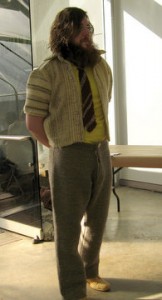A while back, the BBC sent me a questionnaire that I had some fun with, and I was disappointed when they published only excerpts. But now that I have a blog, I get to post anything I want in its entirety! So here’s the whole thing. Do use the comments to suggest better answers.
Continue reading ‘Some Big (and small) Questions’
Author Archive for Steve Landsburg
I have recently finished reading Hunters and Gatherers, a (quite good) novel written and set in 1991, which includes the following plot elements:
1) A door-to-door saleswoman pitches (hardcopy) encyclopedias to customers who eagerly seek easy access to vast quantities of information.
2) A man is eager to read an obscure novel he’s heard about, so he scours used book stores, hoping to find a copy. In the meantime, he’s not sure what the novel is about, and has no way to find out.
3) A comedian stores his collection of jokes on notecards, filling two rooms worth of file cabinets.
4) A collector of sound effects stores her collection on cassette tapes, and has no cost-effective way to create backups.
5) A man is unable to stay in close contact with his (adult) children, because long distance calling rates are prohibitively high.
Among the things you’re sure of, which are you surest of? For Richard Dawkins, writing in the Wall Street Journal, it’s the theory of evolution:
We know, as certainly as we know anything in science, that [evolution] is the process that has generated life on our own planet.
Now, I would be thunderstruck if the theory of evolution turned out to be fundamentally wrong, but not nearly so thunderstruck as if arithmetic turned out to be inconsistent. In fact, I can think of quite a few things I’m more sure about than evolution. For example:
1. The consistency of arithmetic. (This amounts to saying that a single arithmetic problem can’t have two different correct answers.)
2. The existence of conscious beings other than myself.
3. The fact that the North won the American Civil War. (That is, historians are not universally mistaken about this. I am not interested in quibbling about what constitutes a “win”; I mean to assert that the North won in the everyday sense of the word, as reported in all the history texts.)
Continue reading ‘What Are You Surest Of?’
I once owned a book where page 317, in its entirety, read as follows:
ERRATA On page 317, change ERRATA to ERRATUM.
It’s a good thing I didn’t steal that joke. Because as it happens, The Big Questions contains an actual erratum. True, it’s only two missing letters. But of all the letters in the book, these are probably the two I’d least like to have seen go missing.
Fortunately, I discovered this erratum within minutes of receiving my first hardcover books a couple of weeks ago, and the Free Press division of Simon and Schuster sprang into action. Everyone, from the publisher to the editorial assistants to the warehouse managers, understood immediately that we needed to fix this. Better yet, they kept me involved and informed throughout the process, which contrasts dramatically with experiences I’ve had with other publishers.
 Doubly fortunately, I happened to pour out my woes to the brilliant psychometrician Ellen Julian, who suggested that we make up cards much like the one illustrated here and somehow get them into the tens of thousands of books that were scheduled to leave the warehouse the following Monday morning. (This was a Thursday.) The Free Press made it happen in a day, and all would have been well had I not awakened on Saturday to the sickening realization that the cards contained the wrong URL. Now it was the weekend and too late to have new cards made in-house.
Doubly fortunately, I happened to pour out my woes to the brilliant psychometrician Ellen Julian, who suggested that we make up cards much like the one illustrated here and somehow get them into the tens of thousands of books that were scheduled to leave the warehouse the following Monday morning. (This was a Thursday.) The Free Press made it happen in a day, and all would have been well had I not awakened on Saturday to the sickening realization that the cards contained the wrong URL. Now it was the weekend and too late to have new cards made in-house.
Continue reading ‘Today’s the Day’
Steve Levitt and Steve Dubner, the SuperFreakonomics guys (formerly the Freakonomics guys) have raised a lot of temperatures with their chapter on global warming. The backlash began with Paul Krugman, who in turn was neatly skewered by several authors, but most effectively by the journalist Ari Armstrong.
The critics have raised two objections that come perilously close to contradicting each other: First, Levitt and Dubner are accused of minimizing the problem. Second, they are accused of overeagerness to solve the problem, as opposed to, say, demonizing the responsible parties. Of these, only the first deserves to be taken seriously.
In The Big Questions (pages 18-19) I talk (channeling the physicist Eugene Wigner) about the apparently unreasonable effectiveness of mathematics in revealing truths about the physical world. In Wigner’s words, “It is difficult to avoid the impression that a miracle confronts us here.”
But the physicist Peter Landsberg (no relation!) observes that sometimes the miracle runs in the opposite direction, and offers a curious use of physical reasoning to reveal a purely mathematical truth!
Continue reading ‘The Unreasonable Effectiveness of Physics’
Wow. The response to this blog—in comments, in email, and in mentions around the web—has been huge and overwhelmingly positive. I am particularly struck by the many thoughtful (and thought-provoking) comments from attentive readers. We’re only two days into this and I’ve learned a lot already. Thank you.
I’m taking the weekend off, but I’ll be back on Monday to amuse, enlighten, provoke and continue to learn. In the meantime, for your amusement, I present this letter to the editor from the estimable organizer of Freedomfest, correcting a possible Freudian slip at the New York Times:

Here’s a lovely suit of clothes that can be had for, oh, about $10,000. It’s the result of a project conceived by Drexel University instructor Kelly Cobb to make a man’s suit entirely from materials produced within 100 miles of her home. According to an article by Paul Adams in Wired magazine, the suit was produced by a team of 20 artisans, requiring a total of 500 man-hours.
Let’s see, that’s 500 hours of skilled or semi-skilled labor by artisans whose time is probably worth something on the order of $20 an hour. For about $10,000 I can have one made for you.
Continue reading ‘The $10,000 suit’
Logicomix is—I am not making this up—a graphic novel (that is, what we used to call a comic book) about Bertrand Russell and the writing of Principia Mathematica. Implausibly enough, it succeeds, making rather gripping drama out of the twentieth century crisis in the foundations of mathematics. The technical issues are portrayed clearly and accurately (a novice reader could learn a lot from this book) but never coldly; this is above all a saga about human obsession. I even like the device where the authors themselves appear as characters, trying to figure out how best to present this stuff. It works.
But there’s one part I find almost impossible to believe is accurate; maybe a reader can set me straight. The novel begins in 1939 and proceeds by flashback. In 1939 we see Russell, a lifelong pacifist confronted by the Nazi horror, being shaken to the core by the realization that his beloved Logic does not contain the answers to all of life’s problems. Can there be even a shred of truth to this? Surely the man who devoted his youth and over 300 printed pages to proving that 1+1=2 must always have been well aware that formal logic has its limitations as a practical guide to life.
Continue reading ‘Principia Mathematica: The Comic Book’
I said this in The Big Questions and I’ll say it again: Richard Dawkins is an international treasure and one of my personal heroes, but he’s got this God thing all wrong. Here’s some of his latest, from the Wall Street Journal:
Where does [Darwinian evolution] leave God? The kindest thing to say is that it leaves him with nothing to do, and no achievements that might attract our praise, our worship or our fear. Evolution is God’s redundancy notice, his pink slip. But we have to go further. A complex creative intelligence with nothing to do is not just redundant. A divine designer is all but ruled out by the consideration that he must be at least as complex as the entities he was wheeled out to explain. God is not dead. He was never alive in the first place.
But Darwinian evolution can’t replace God, because Darwinian evolution (at best) explains life, and explaining life was never the hard part. The Big Question is not: Why is there life? The Big Question is: Why is there anything? Explaining life does not count as explaining the Universe.
Continue reading ‘There He Goes Again’
The American health care system desperately needs reform. But there are certain inescapable truths that would-be reformers would do well to heed; otherwise they risk making things worse for everyone, and particularly for the poor. Here are a few of those truths.
1. Insurance is not part of the solution; it’s part of the problem. Many people—and especially poor people— get too little health care in this country. That’s largely because many other people—and especially rich people—are overinsured. People with insurance demand more health care, which drives up prices. More insurance coverage will make this problem worse, not better.
Continue reading ‘Thoughts on Health Care Reform’
The Big Questions should be in the stores shortly. I expect and hope that my readers will have a lot to say about it. I welcome your thoughts, comments and complaints at this email address: questions at landsburg dot com.
Over the years, I’ve learned a lot from my readers and I expect I’m about to learn a lot more. I’ll use this blog to share some of what I learn—along with anything else that strikes my fancy.
If you choose to comment, your first post will be held for moderation. Once that first post is approved, your future posts will be approved automatically. I’ll delete or edit comments only when they’re clearly quite unserious or abusive. I’m looking forward to this dialogue.

